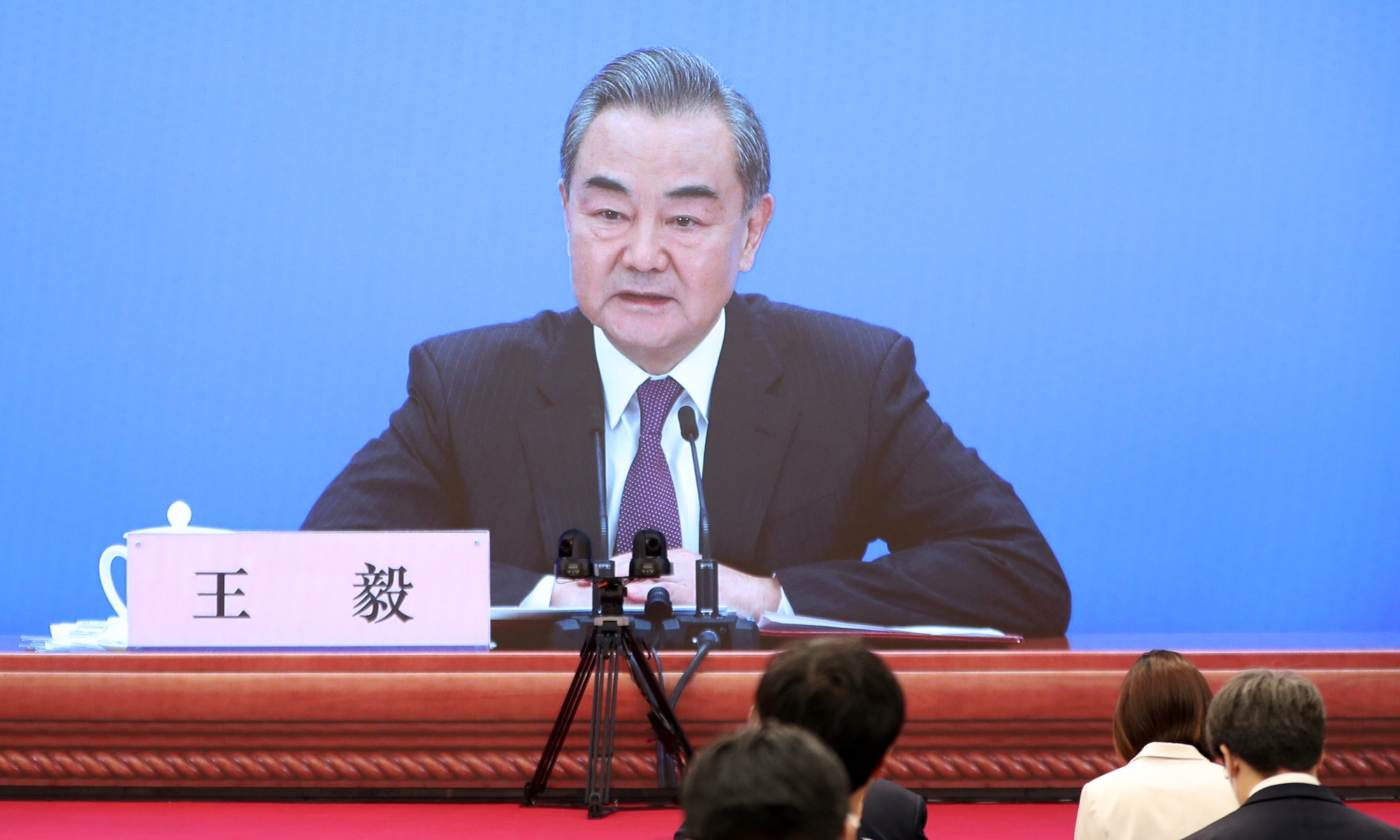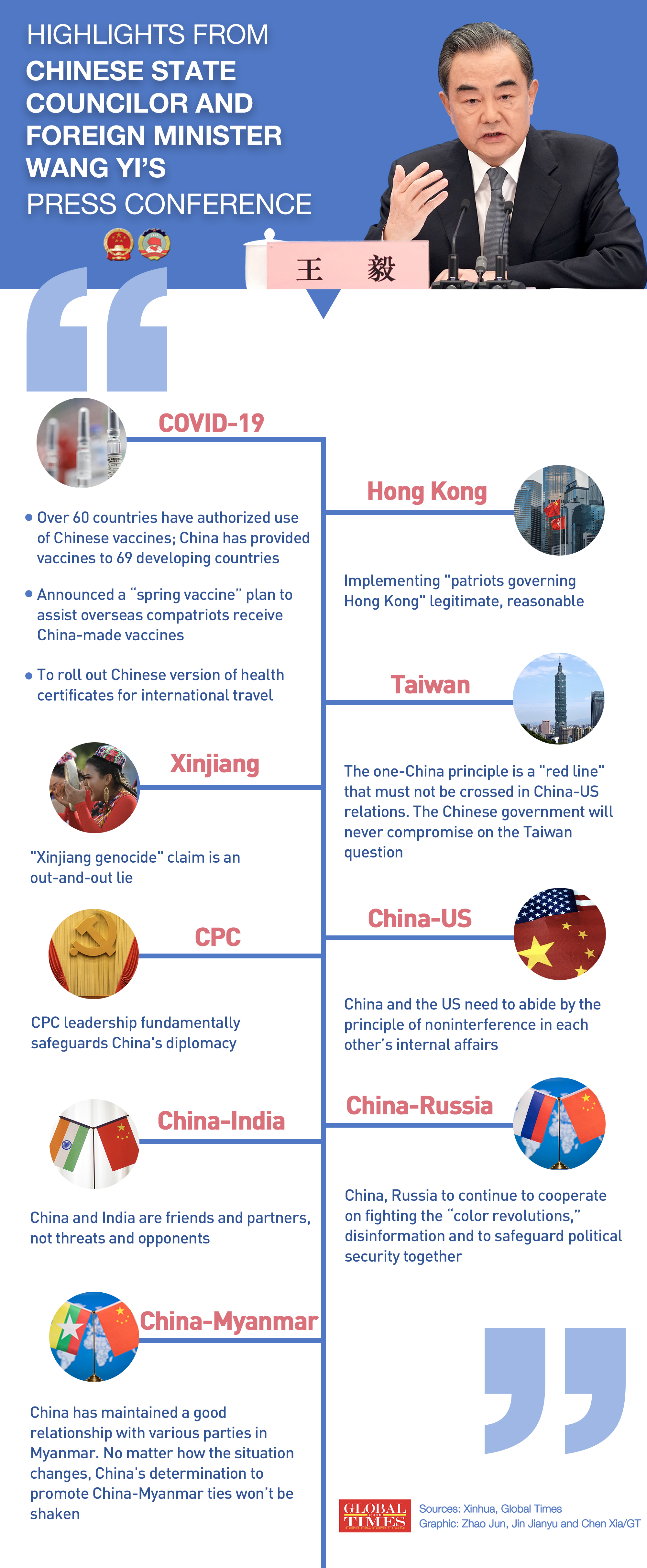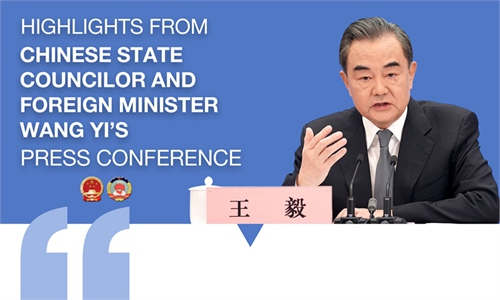
Chinese State Councilor and Foreign Minister Wang Yi holds a press conference Sunday afternoon on the sidelines of the fourth session of the 13th National People's Congress. Wang took questions of journalists from home and abroad on China's foreign policy and foreign relations. Photo: cnsphoto
Chinese State Councilor and Foreign Minister Wang Yi on Sunday declared China's latest stances on many questions and issues at a press conference, including China's ties with major powers like the US, Russia and the EU, as well as hot spot issues and global challenges like the Myanmar situation, the Paris Agreement, COVID-19 vaccines and the Iranian nuclear deal.
The foreign minister's press conference held on the sidelines of China's annual two sessions has always received attention worldwide as it provides the world a chance to learn about China's latest stances and plans for the future on foreign affairs, with Wang "breaking a record" this year by taking 27 questions in 1 hour and 40 minutes.
Experts said, as always, China clarified its red line on core interests including Taiwan, Xinjiang and Hong Kong again, and also made some new points such as cooperating with Russia to handle threats stemming from "color revolutions" and disinformation on social media platforms and to provide COVID-19 vaccines for overseas Chinese and athletes who will attend the upcoming Tokyo Olympics.

Highlights from Chinese State Councilor and Foreign Minister Wang Yi’s Press Conference. Graphic: GT
Real and fake multilateralism
The US was mentioned frequently throughout Wang's press conference, as the North American country is a key factor that could impact China's interests and policies on many internal and external issues, and Chinese experts have highlighted that China has put forward its definition of "real multilateralism" since the new administration of US President Joe Biden claimed that "America is back" vowing to take part in multilateralism again.
Multilateralism has always been China's firm choice. To solve world problems, the key is for all countries to insist on real multilateralism. "China believes that real multilateralism means respecting the UN Charter principles, safeguarding the international order with the UN at the core, and promoting democratization of international relations," Wang remarked.
Building small circles in the name of multilateralism is in fact "group politics," multilateralism with one's own interests taking precedence is still unilateral thinking, and "selective multilateralism" is not the right way, Wang said.
Although Wang didn't name the US in this matter, Chinese analysts said that Wang was indirectly pointing out the problems of the Biden administration's foreign policy, as the US has been ganging up with its allies to form a common strategy against China. Biden might just continue executing Trump's unilateralism in the name of multilateralism, and China has to point it out to let the rest of the world see it.
Jin Canrong, associate dean of the School of International Studies at the Renmin University of China, told the Global Times on Sunday that unlike China's attitude toward the UN or the WTO, "the US has always treated those international platforms as 'tools' to serve its hegemony, and when these platforms require the US to take responsibility, no matter if it is governed by Democrats or Republicans, the US has always been selfish."
The "multilateralism" that Biden is selling to the world is basically the Five Eyes Alliance, the trans-Atlantic relationship with Europe, and the Quad that includes Japan, India and Australia with this US-led order having mostly constituted of Western developed countries and almost no developing countries, said analysts.
Jin said China's multilateralism covers more countries in the third word, and also doesn't exclude any developed country. "At this moment, US-led groups are dominating the narratives in international media so they can still stigmatize China's contribution to promote multilateralism when China provides COVID-19 vaccines to other countries and promotes the Belt and Road Initiative."
But eventually, as long as China continues its efforts to benefit more countries and to reform the international order, the international community will realize who the real champion is to safeguard multilateralism, Jin noted.
Message to Washington
Analysts said Wang's message to the US on Sunday is a summary of China's most recent demands, hopes and warnings. Wang has reaffirmed what China's red lines are that cannot be crossed. China hopes that the new US administration will make a "clear departure" from its predecessor's "dangerous practices" on Taiwan.
Lü Xiang, an expert in US studies with the Chinese Academy of Social Sciences in Beijing, told the Global Times on Sunday that Biden is smarter than Donald Trump as Biden understands that Taiwan is something he can't touch. And nowadays, if the US makes further risky provocations, it would just provide a chance for the Chinese mainland to reunify the island once and for all.
On Xinjiang- and Hong Kong-related affairs, which are also significant parts of China's core interests, Wang also firmly responded to stigmatization and interference launched by the West, especially the US, which has been recently playing the "big lie" diplomacy with its close allies to cook up the "genocide" accusations about China's Xinjiang.
"When talking about genocide, most people would recall the atrocities against 'Indians' [Native Americans] in North America in the 16th century, against African slaves in the 19th century, against Jews in the 20th century and today's aborigines in Australia," Wang remarked.
Drawing a red line is China's responsibility for avoiding conflicts with the US, but if the US doesn't treat the warning seriously, conflicts could still take place, but launching dangerous geopolitical offensives remain unlikely, as the Biden administration could be more aggressive on propaganda warfare and could target China's science and technology, Lü said.
China hopes that the US will meet it half way and remove all unreasonable restrictions on bilateral cooperation as early as possible, and not create new obstacles, said Wang, also listing issues that require cooperation including fighting COVID-19, the economic recovery and climate change.
China welcomes the US' return to the Paris Agreement and expects that the US will shoulder its responsibility and make its due contribution, Wang remarked.
Lü said cooperation with China on climate change is a topic that the US is most interested in, but since Washington had once withdrew from the Paris Agreement, China has to urge the US to make more concrete contributions.
"The Biden administration has to convince China and the EU by taking the obligation of funding, and make a clear promise on carbon emissions. The next administration might withdraw from the agreement again," so Biden needs to put in his share to convince other countries that they can trust the US again, Lü noted.
Fighting the 'political virus'
The US is also a key element that pushes China and Russia to stand closer together, as Washington creates similar threats against both Moscow and Beijing at the same time.
China and Russia fought COVID-19 and the "political virus" together in 2020, Wang said, noting that the two sides will continue to cooperate on fighting "color revolutions," and disinformation, and to safeguard political security.
Yang Jin, an expert at the Institute of Russian, Eastern European and Central Asian Studies at the Chinese Academy of Social Sciences, told the Global Times on Sunday that although Wang didn't specify who exactly created the problems of "color revolutions" and disinformation on social media, "everyone with common sense could understand that these problems were mostly created by the US and its allies."
The US has used local problems to hype and incite many "color revolutions" inside Russia's key neighbors like Belarus and Ukraine recently and in the past, the US and its allies are even trying to create one in the heart of Russia, Yang said, noting that China shares similar instances, such as the 2019 Hong Kong turmoil.
China and Russia could have broad cooperation on this matter - increasing people exchanges between young people and the media outlets of the two countries, so that they can reinforce shared values, such as patriotism, speaking to the world with a similar voice on the same issues and immunity to disinformation on social media; to increase intelligence sharing between law-enforcement and national security agencies so that both sides can crack down on espionage activities in joint operations, Yang said.
Hot spot issues
Apart from addressing ties with major powers, Wang also released China's stance on the most recent hot spot issues. Some Western media outlets and local NGOs in Myanmar have frequently and groundlessly accused China of interfering in the country's internal strife.
"The immediate priority for Myanmar is to prevent further bloodshed and conflict, and ease and cool down the situation as soon as possible," Wang said. The conflict between protesters and the military of Myanmar have caused dozens of casualties.
China hopes various parties in Myanmar will stay calm and restrained, solve conflicts within the constitutional framework, and keep promoting the democratization process of the country, Wang noted.
"Myanmar is a member of the ASEAN family, and China supports the principle of noninterference upheld by ASEAN. China is also willing to communicate with various parties in Myanmar on the basis of respect for Myanmar's sovereignty and the will of the people to contribute to the de-escalation of tensions," Wang remarked.
China has maintained good relations with various parties in Myanmar, including the National League for Democracy. No matter how the situation changes, China's determination to promote China-Myanmar ties won't be shaken, the foreign minister said.
On the Iranian nuclear deal, Wang said China urged the US to demonstrate good faith and return to the deal at an early date.




